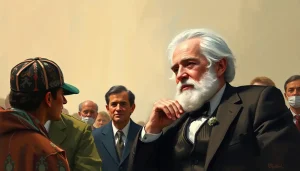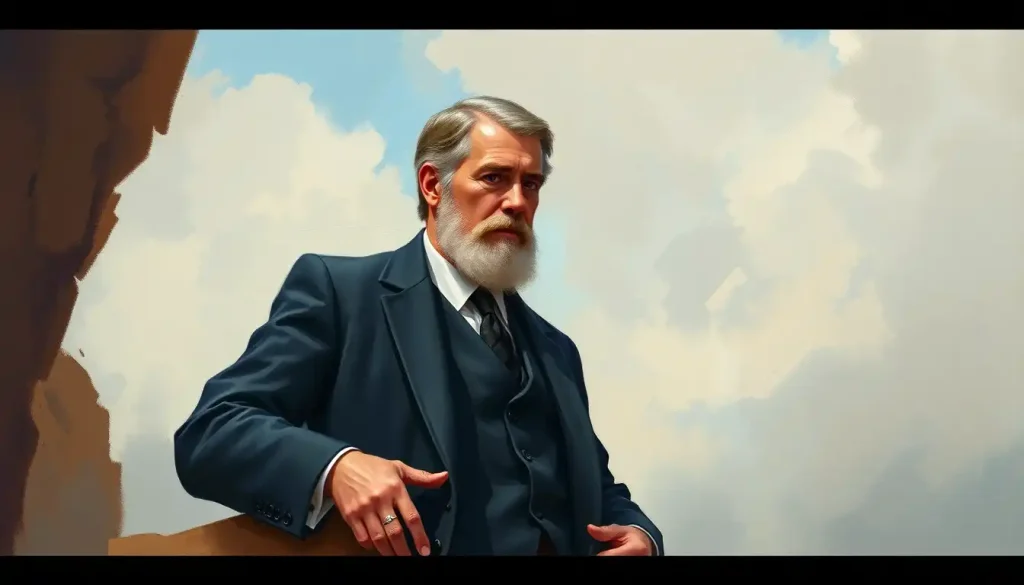While modern billionaires debate their charitable legacies on social media, the original blueprint for ethical wealth distribution was penned over a century ago in one of history’s most influential essays on philanthropy. This groundbreaking work, “The Gospel of Wealth,” was authored by Andrew Carnegie, a man whose rags-to-riches story epitomizes the American Dream. But Carnegie’s legacy extends far beyond his business acumen; his philanthropic philosophy has shaped the landscape of charitable giving for generations.
The Man Behind the Gospel: Andrew Carnegie’s Rise to Wealth
Born in 1835 in Dunfermline, Scotland, Andrew Carnegie immigrated to the United States with his family at the tender age of 13. From humble beginnings as a bobbin boy in a cotton mill, Carnegie’s relentless drive and shrewd business sense propelled him to the pinnacle of the steel industry. By the late 19th century, he had amassed a fortune that would make him one of the wealthiest men in history.
But Carnegie was not content to simply hoard his wealth. In 1889, at the height of his success, he published “The Gospel of Wealth,” an essay that would revolutionize the concept of philanthropy and challenge the wealthy elite to reconsider their responsibilities to society.
The Gospel’s Core Message: Wealth as a Sacred Trust
At the heart of Carnegie’s philosophy lies a radical notion: that vast personal wealth is not a right, but a responsibility. In his own words, “The problem of our age is the proper administration of wealth.” This statement encapsulates the central thesis of the Gospel of Wealth – that those who have accumulated great fortunes have a moral obligation to use their wealth for the betterment of society.
Carnegie’s views on wealth inequality were surprisingly progressive for his time. He recognized the growing disparity between the rich and the poor as a potential source of social unrest. Rather than advocating for the redistribution of wealth through government intervention, however, Carnegie proposed a different solution: voluntary philanthropy on a massive scale.
One of the most famous quotes from “The Gospel of Wealth” states, “The man who dies thus rich dies disgraced.” This powerful statement underscores Carnegie’s belief that the ultimate purpose of wealth is not personal aggrandizement, but social good. He argued that the wealthy had a duty to use their surplus wealth during their lifetimes to create opportunities for others to improve their lot in life.
The Sacred Trust: Philanthropy as a Moral Imperative
Carnegie’s vision of philanthropy went far beyond simple charity. He saw surplus wealth as “a sacred trust which its possessor is bound to administer in his lifetime for the good of the community.” This concept of stewardship – the idea that wealth should be managed for the benefit of others – was revolutionary in an era of robber barons and unchecked capitalism.
But how should this wealth be administered? Carnegie had clear ideas on this front as well. He believed that the best form of philanthropy was not handouts or alms, but investments in infrastructure and education that would enable people to help themselves. As he famously put it, “The best means of benefiting the community is to place within its reach the ladders upon which the aspiring can rise.”
This approach to charitable giving, focused on creating opportunities rather than merely alleviating immediate needs, has had a profound impact on modern philanthropy. Today, we see echoes of Carnegie’s philosophy in the work of foundations and philanthropists who focus on systemic change and long-term solutions to social problems.
The Duties of the Wealthy: Living Modestly and Providing Wisely
Carnegie didn’t just preach about the responsibilities of wealth; he lived them. He outlined specific duties for the wealthy, beginning with “To set an example of modest, unostentatious living, shunning display or extravagance.” This principle stands in stark contrast to the conspicuous consumption often associated with great wealth, both in Carnegie’s time and our own.
The second duty he outlined was “To provide moderately for the legitimate wants of those dependent upon him.” Carnegie believed that while it was important to care for one’s family, excessive inheritance could be harmful both to the recipients and to society at large.
These principles reflect Carnegie’s belief that wealth should be used as a tool for social good, rather than as a means of personal indulgence or familial aggrandizement. It’s a philosophy that challenges us to rethink our relationship with money and success, asking us to consider not just what we can accumulate, but what we can contribute.
The Perils of Inherited Wealth: A Controversial Stance
Perhaps one of the most controversial aspects of Carnegie’s philosophy was his stance on inherited wealth. He believed that passing on large fortunes to one’s children was not only detrimental to society but also harmful to the recipients themselves. In his words, “The parent who leaves his son enormous wealth generally deadens the talents and energies of the son, and tempts him to lead a less useful and less worthy life than he otherwise would.”
This view was radical for its time and remains contentious today. Carnegie argued that “Great sums bequeathed oftener work more for the injury than for the good of the recipients.” He believed that inherited wealth could stifle ambition and lead to a life of indolence and waste.
Instead, Carnegie advocated for what we might today call “giving while living.” He practiced what he preached, giving away the vast majority of his fortune during his lifetime to fund libraries, educational institutions, and other philanthropic causes. By the time of his death in 1919, he had given away approximately $350 million (equivalent to billions in today’s dollars).
The Legacy of the Gospel: Impact and Criticism
The impact of Carnegie’s “Gospel of Wealth” on modern philanthropy cannot be overstated. His philosophy has influenced generations of wealthy individuals and shaped the development of institutional philanthropy. The idea that great wealth comes with great responsibility has become a cornerstone of modern philanthropic thought.
Many of today’s most prominent philanthropists, from Bill Gates to Warren Buffett, have echoed Carnegie’s sentiments in their own giving pledges. The Charity Does Not Decrease Wealth: The Surprising Benefits of Giving movement, which encourages billionaires to give away the majority of their wealth during their lifetimes, can trace its intellectual roots back to Carnegie’s Gospel.
However, Carnegie’s philosophy has not been without its critics. Some argue that his approach to philanthropy was paternalistic, allowing the wealthy to dictate the terms of social progress. Others point out the irony of Carnegie’s immense charitable giving in light of the harsh labor practices in his steel mills.
Despite these criticisms, the core principles of the Gospel of Wealth continue to resonate in our discussions about wealth, inequality, and social responsibility. As we grapple with growing wealth disparities and pressing social issues, Carnegie’s ideas remain as relevant as ever.
The Gospel of Wealth in the Modern Era: Adapting Carnegie’s Principles
In today’s world, where the gap between the ultra-wealthy and the rest of society continues to widen, Carnegie’s philosophy takes on new significance. The question of how to ethically manage and distribute vast fortunes is as pressing now as it was in the Gilded Age.
Modern philanthropists are adapting Carnegie’s principles to address contemporary challenges. For instance, the concept of “effective altruism” – using evidence and reason to determine the most effective ways to benefit others – can be seen as an evolution of Carnegie’s emphasis on strategic giving.
Similarly, the rise of impact investing and social entrepreneurship reflects Carnegie’s belief in creating “ladders upon which the aspiring can rise.” These approaches seek to harness the power of markets and innovation to drive social change, much as Carnegie sought to use his business acumen in service of his philanthropic goals.
Wealth and Social Responsibility: Lessons for Today
While the specifics of Carnegie’s approach may not always translate directly to our modern context, the core message of the Gospel of Wealth remains powerfully relevant. It challenges us to view wealth not as an end in itself, but as a means to create positive change in the world.
For those aspiring to build wealth, Carnegie’s philosophy offers valuable insights. It reminds us that true success is measured not just in dollars and cents, but in the positive impact we can have on our communities and the world at large. As explored in Carnegie Wealth Today: Lessons from Andrew Carnegie’s Principles for Modern Investors, his principles can guide us in building wealth ethically and using it responsibly.
Moreover, Carnegie’s ideas challenge us to think critically about the role of wealth in society. In an era of increasing concern about Wealth and Poverty: Examining George Gilder’s Influential Economic Theory, Carnegie’s emphasis on the moral obligations of the wealthy offers a potential path forward.
The Ongoing Debate: Wealth, Inequality, and Social Progress
The publication of “The Gospel of Wealth” sparked a debate that continues to this day. How should society address wealth inequality? What are the responsibilities of the wealthy to the broader community? These questions remain at the forefront of our social and political discourse.
Carnegie’s assertion that “The contrast between the palace of the millionaire and the cottage of the laborer with us today measures the change which has come with civilization” resonates strongly in our current era of stark economic disparities. His words remind us that Wealth Inequality Quotes: Powerful Insights on Economic Disparity are not just academic observations, but calls to action.
At the same time, Carnegie’s emphasis on private philanthropy as a solution to social ills has been challenged by those who argue for more systemic changes. The ongoing debate between private charity and public policy as means of addressing social issues echoes the tensions present in Carnegie’s time.
The Spiritual Dimension: Wealth and Moral Philosophy
While Carnegie’s “Gospel of Wealth” was not explicitly religious, its title and moral underpinnings reflect the complex relationship between wealth and spirituality. This intersection continues to be explored in various contexts, from the Wealth Gospel: Examining the Controversial Prosperity Doctrine in Modern Christianity to broader discussions about the ethics of accumulation and distribution of wealth.
The tension between material success and moral or spiritual fulfillment that Carnegie grappled with remains a central concern for many today. His philosophy offers a potential reconciliation, suggesting that the pursuit of wealth can be morally justified if it is ultimately used for the greater good.
This perspective stands in contrast to other religious and philosophical traditions that view wealth more skeptically. The ongoing dialogue between different views on wealth and spirituality, such as the Social Gospel vs Gospel of Wealth: Contrasting Ideologies in American Christianity, continues to shape our understanding of the moral dimensions of economic success.
Words of Wisdom: The Enduring Power of Carnegie’s Quotes
Throughout “The Gospel of Wealth” and his other writings, Carnegie left us with a treasure trove of Wealth Quotes: Timeless Wisdom to Inspire Financial Success. These pithy statements encapsulate profound truths about wealth, responsibility, and the human condition.
Consider, for instance, his observation that “The first man who, having enclosed a piece of ground, bethought himself of saying ‘This is mine,’ and found people simple enough to believe him, was the real founder of civil society.” This quote, while not from “The Gospel of Wealth,” reflects Carnegie’s nuanced understanding of the origins and implications of private property and wealth accumulation.
Or ponder his warning that “There is no class so pitiably wretched as that which possesses money and nothing else.” This statement serves as a poignant reminder of the Wealth and Greed Dangers: The Dark Side of Prosperity, cautioning against the pursuit of wealth for its own sake.
The Gospel for a New Generation: Accessibility and Interpretation
While Carnegie’s original essay continues to be studied and debated, its 19th-century prose can be challenging for modern readers. Fortunately, resources like The Gospel of Wealth PDF: Andrew Carnegie’s Philanthropic Philosophy make this seminal work more accessible to contemporary audiences.
Moreover, modern interpretations and analyses of Carnegie’s ideas, such as those found in Gospel of Wealth: Andrew Carnegie’s Revolutionary Approach to Philanthropy, help to contextualize his philosophy for our current era, drawing out its continued relevance and applicability.
Conclusion: The Enduring Legacy of the Gospel of Wealth
As we reflect on Carnegie’s “Gospel of Wealth” more than a century after its publication, its core message continues to challenge and inspire us. In a world grappling with unprecedented levels of wealth concentration alongside persistent social challenges, Carnegie’s call for ethical wealth distribution and strategic philanthropy remains as relevant as ever.
The essay’s key quotes – from “The problem of our age is the proper administration of wealth” to “The man who dies thus rich dies disgraced” – continue to provoke thought and debate. They remind us that with great wealth comes great responsibility, and that true success is measured not just in what we accumulate, but in what we contribute to the betterment of society.
Carnegie’s philosophy, while not without its critics and limitations, offers a compelling vision of how private wealth can be leveraged for public good. It challenges us to think deeply about our own relationship with money, success, and social responsibility.
As we face the complex challenges of the 21st century – from climate change to global health crises to persistent inequality – the principles outlined in the “Gospel of Wealth” can serve as a guide. They remind us that those who have benefited most from our economic system have a particular obligation to contribute to its improvement and to the welfare of all.
In the end, Carnegie’s legacy is not just in the libraries he built or the institutions he funded, but in the ongoing conversation he sparked about the nature of wealth, the responsibilities it entails, and the potential for private philanthropy to drive social progress. As we continue to grapple with these issues, the “Gospel of Wealth” remains an essential text, challenging each new generation to consider how they can use their resources – whether great or small – to make a positive impact on the world.
References:
1. Carnegie, A. (1889). The Gospel of Wealth. North American Review.
2. Nasaw, D. (2006). Andrew Carnegie. Penguin Press.
3. Bishop, M., & Green, M. (2008). Philanthrocapitalism: How the Rich Can Save the World. Bloomsbury Press.
4. Zunz, O. (2014). Philanthropy in America: A History. Princeton University Press.
5. Reich, R. (2018). Just Giving: Why Philanthropy Is Failing Democracy and How It Can Do Better. Princeton University Press.
6. Callahan, D. (2017). The Givers: Wealth, Power, and Philanthropy in a New Gilded Age. Alfred A. Knopf.
7. Carnegie, A. (1920). Autobiography of Andrew Carnegie. Houghton Mifflin Company.
8. Goldin, C., & Katz, L. F. (2008). The Race between Education and Technology. Harvard University Press.
9. Piketty, T. (2014). Capital in the Twenty-First Century. Harvard University Press.
10. Gates, B., & Gates, M. (2020). The Giving Pledge. Available at: https://givingpledge.org/












Would you like to add any comments? (optional)